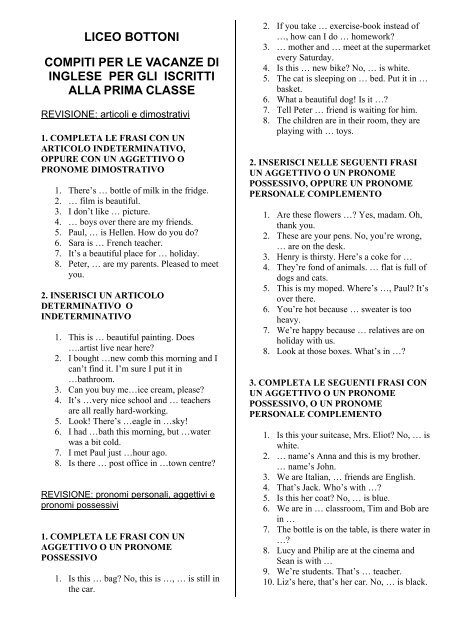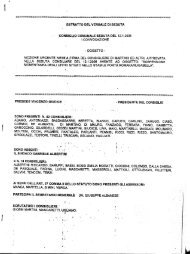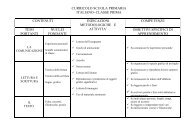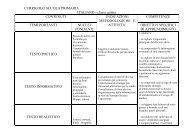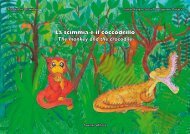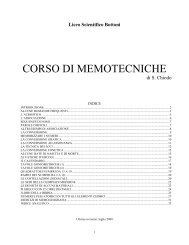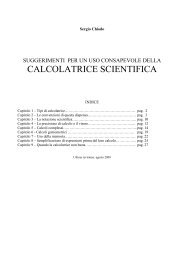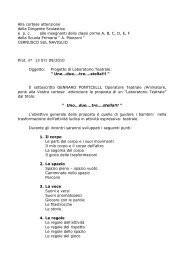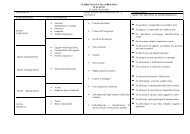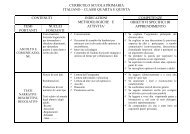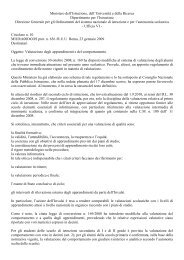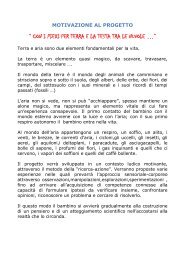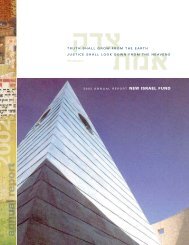liceo bottoni - Rete Civica di Milano
liceo bottoni - Rete Civica di Milano
liceo bottoni - Rete Civica di Milano
Create successful ePaper yourself
Turn your PDF publications into a flip-book with our unique Google optimized e-Paper software.
LICEO BOTTONI<br />
COMPITI PER LE VACANZE DI<br />
INGLESE PER GLI ISCRITTI<br />
ALLA PRIMA CLASSE<br />
REVISIONE: articoli e <strong>di</strong>mostrativi<br />
1. COMPLETA LE FRASI CON UN<br />
ARTICOLO INDETERMINATIVO,<br />
OPPURE CON UN AGGETTIVO O<br />
PRONOME DIMOSTRATIVO<br />
1. There’s … bottle of milk in the fridge.<br />
2. … film is beautiful.<br />
3. I don’t like … picture.<br />
4. … boys over there are my friends.<br />
5. Paul, … is Hellen. How do you do<br />
6. Sara is … French teacher.<br />
7. It’s a beautiful place for … holiday.<br />
8. Peter, … are my parents. Pleased to meet<br />
you.<br />
2. INSERISCI UN ARTICOLO<br />
DETERMINATIVO O<br />
INDETERMINATIVO<br />
1. This is … beautiful painting. Does<br />
….artist live near here<br />
2. I bought …new comb this morning and I<br />
can’t find it. I’m sure I put it in<br />
…bathroom.<br />
3. Can you buy me…ice cream, please<br />
4. It’s …very nice school and … teachers<br />
are all really hard-working.<br />
5. Look! There’s …eagle in …sky!<br />
6. I had …bath this morning, but …water<br />
was a bit cold.<br />
7. I met Paul just …hour ago.<br />
8. Is there … post office in …town centre<br />
REVISIONE: pronomi personali, aggettivi e<br />
pronomi possessivi<br />
1. COMPLETA LE FRASI CON UN<br />
AGGETTIVO O UN PRONOME<br />
POSSESSIVO<br />
1. Is this … bag No, this is …, … is still in<br />
the car.<br />
2. If you take … exercise-book instead of<br />
…, how can I do … homework<br />
3. … mother and … meet at the supermarket<br />
every Saturday.<br />
4. Is this … new bike No, … is white.<br />
5. The cat is sleeping on … bed. Put it in …<br />
basket.<br />
6. What a beautiful dog! Is it …<br />
7. Tell Peter … friend is waiting for him.<br />
8. The children are in their room, they are<br />
playing with … toys.<br />
2. INSERISCI NELLE SEGUENTI FRASI<br />
UN AGGETTIVO O UN PRONOME<br />
POSSESSIVO, OPPURE UN PRONOME<br />
PERSONALE COMPLEMENTO<br />
1. Are these flowers … Yes, madam. Oh,<br />
thank you.<br />
2. These are your pens. No, you’re wrong,<br />
… are on the desk.<br />
3. Henry is thirsty. Here’s a coke for …<br />
4. They’re fond of animals. … flat is full of<br />
dogs and cats.<br />
5. This is my moped. Where’s …, Paul It’s<br />
over there.<br />
6. You’re hot because … sweater is too<br />
heavy.<br />
7. We’re happy because … relatives are on<br />
holiday with us.<br />
8. Look at those boxes. What’s in …<br />
3. COMPLETA LE SEGUENTI FRASI CON<br />
UN AGGETTIVO O UN PRONOME<br />
POSSESSIVO, O UN PRONOME<br />
PERSONALE COMPLEMENTO<br />
1. Is this your suitcase, Mrs. Eliot No, … is<br />
white.<br />
2. … name’s Anna and this is my brother.<br />
… name’s John.<br />
3. We are Italian, … friends are English.<br />
4. That’s Jack. Who’s with …<br />
5. Is this her coat No, … is blue.<br />
6. We are in … classroom, Tim and Bob are<br />
in …<br />
7. The bottle is on the table, is there water in<br />
…<br />
8. Lucy and Philip are at the cinema and<br />
Sean is with …<br />
9. We’re students. That’s … teacher.<br />
10. Liz’s here, that’s her car. No, … is black.
4. TRADUCI LE SEGUENTI FRASI<br />
1. Chi è quella bella ragazza È mia sorella.<br />
2. Questo è il suo (<strong>di</strong> lei) quaderno No, il<br />
suo è verde.<br />
3. Questo è Jim. Suo padre è con lui.<br />
4. I loro cugini francesi sono qui. Sono<br />
molto simpatici.<br />
5. Questi fiori sono per lei, Mrs. Taylor.<br />
Grazie.<br />
6. Questi sono i nostri panini No, i vostri<br />
sono laggiù.<br />
7. Quelli sono i nostri compagni. Sono<br />
ragazzi molto simpatici.<br />
8. Questo libro è interessante. È tuo<br />
REVISIONE: to be / to have<br />
1. TRADUCI LE SEGUENTI FRASI<br />
1. È per me questo regalo No, non è per te,<br />
è per tuo fratello. Oggi è il suo<br />
compleanno.<br />
2. Buongiorno Sig.ra White. Ci sono due<br />
lettere per lei oggi.<br />
3. Dick e Ron non sono qui con noi. Sono al<br />
parco con i loro amici.<br />
4. Di chi sono queste scarpe da tennis Non<br />
sono le mie, forse sono le sue (<strong>di</strong> lei).<br />
5. Hai fretta Sì, è tar<strong>di</strong> e devo andare a<br />
casa.<br />
6. Di chi sono queste magliette bianche<br />
Sono vostre Sì mamma, sono le nostre.<br />
7. I nostri amici hanno sete. Cosa c’è per<br />
loro da bere Ci sono delle bibite in<br />
frigorifero.<br />
8. Dov’è la mamma È in cucina con la sua<br />
amica.<br />
2. COSTRUISCI FRASI DI SENSO<br />
COMPIUTO USANDO IL VERBO TO HAVE<br />
E AGGIUNGENDO GLI ELEMENTI<br />
NECESSARI<br />
1. What time/he/<strong>di</strong>nner<br />
2. She/never/lunch/at the office.<br />
3. Let’s/a drink/pub/round/corner.<br />
4. Mum/usually/rest/afternoon.<br />
5. They/not/tea/every/day.<br />
6. You/coffee/after/lunch<br />
7. I/shower/every morning.<br />
8. They/not/breakfast/before 8.00.<br />
3. COSTRUISCI FRASI DI SENSO<br />
COMPIUTO CON TO HAVE<br />
AGGIUNGENDO GLI ELEMENTI<br />
NECESSARI<br />
1. My grandmother/often/nap/after lunch.<br />
2. What time/<strong>di</strong>nner/evening<br />
3. On Saturdays/we/always/a<br />
walk/afternoon.<br />
4. The children/usually/fun/funfair.<br />
5. It’s hot/why/you/bath.<br />
6. Oh, there’s/new shop/let’s/look.<br />
7. In the morning/we/a snack/at 11.00.<br />
8. I want/a party/would you like/come<br />
9. Let’s/a chat/it’s not/late<br />
10. Why/don’t we/<strong>di</strong>nner/together/this<br />
evening<br />
4. TRADUCI LE SEGUENTI FRASI<br />
1. Il libro sulla scrivania è un regalo per<br />
George.<br />
2. Siete studenti tedeschi No, siamo<br />
francesi.<br />
3. Chi sono quei bambini Sono i loro figli,<br />
sono gemelli.<br />
4. Sono <strong>di</strong>fficili questi esercizi No, sono<br />
esercizi facili.<br />
5. È carina tua sorella Sì, è alta e snella.<br />
6. C’è una lettera per la mamma Sì, ci sono<br />
due lettere e una cartolina.<br />
7. Questo è un albergo economico, ma<br />
pulito e confortevole.<br />
8. Che cosa c’è in quelle scatole .<br />
9. Posso parlare con Mark Non è a casa, è a<br />
scuola.<br />
10. Tuo padre è me<strong>di</strong>co Sì.<br />
5. TRADUCI LE SEGUENTI FRASI<br />
1. Quando ho sete bevo sempre acqua<br />
minerale.<br />
2. Perché non <strong>di</strong>ciamo loro <strong>di</strong> restare a<br />
pranzo È presto e non hanno fretta.<br />
3. Se hai fame, perché non mangi un<br />
panino<br />
4. Se hai freddo, pren<strong>di</strong> il mio maglione.<br />
5. Mio figlio non ha paura dei cani.<br />
6. Che ore sono Le 12.30. È tar<strong>di</strong>, devo<br />
andare a casa.<br />
7. Perché non venite con noi al pub Ci<br />
spiace, abbiamo fretta.<br />
8. Ho caldo, posso aprire la finestra
PREPOSIZIONI<br />
1. INSERIRE LE PREPOSIZIONI DI<br />
TEMPO AT IN ON<br />
1. My birthday is …..May<br />
2. His birthday is …….12 th March<br />
3. We usually go skiing …..the weekends<br />
4. Are you free ……Saturday<br />
5. School starts …….8,15 AM<br />
6. We’ve got lessons ……..the morning and<br />
sometimes …….the afternoon<br />
7. This street is very quiet ……night<br />
8. I never have lunch ……noon<br />
9. I’ll have a party …..my birthday<br />
10. When was your mum born…..1960<br />
2. INSERIRE LE PREPOSIZIONI DI<br />
TEMPO IN ON AT<br />
1. We are always at school ….8.30<br />
2. This firm is closed ….August<br />
3. Paul wasn’t at home yesterday ….midday<br />
4. Dad is coming back ….my birthday<br />
5. She is often at home ….the evening<br />
6. We always have a music lesson<br />
….Monday<br />
7. We always have our holidays ….the<br />
summer<br />
8. They always have breakfast ….7.30<br />
3. INSERIRE LE PREPOSIZIONI DI<br />
LUOGO AT TO IN FROM (se necessario)<br />
1. Where’s your friend …..<br />
- She’s …..Spain, but she lives ….Italy<br />
2. The post office is ….Lombard street<br />
3. The Prime Minister lives ….10, Downing<br />
street<br />
4. My sister is not …home now: she never<br />
comes…..home for lunch<br />
5. Mrs Smith lives ….that nice cottage not<br />
far ……the church<br />
6. Is Jennifer ….school No, she doesn’t go<br />
…school on Saturday<br />
7. I always walk ….the railway station in<br />
the morning<br />
8. This bus goes…….Picca<strong>di</strong>lly … the East<br />
End<br />
9. What time do you usually go….home<br />
10. We usually meet ….the bus stop<br />
4. COMPLETA LE SEGUENTI FRASI<br />
TRADUCENDO LE ESPRESSIONI FRA<br />
PARENTESI<br />
1. Where’s your house It’s (in) Burton<br />
Street, (al n° 10 <strong>di</strong> Burton Street)<br />
2. There is a beautiful cottage (vicino al<br />
fiume)<br />
3. That’s a nice carpet (sotto quel tavolo)<br />
4. Where’s Tom He’s going (al cinema)<br />
5. Are you (a casa) this evening<br />
6. There are some books (sulla cattedra)<br />
7. The children are going (in cucina)<br />
8. There’s a nice pub (accanto) the new<br />
cinema<br />
5. COSTRUISCI DELLE FRASI DI SENSO<br />
COMPIUTO AGGIUNGENDO GLI<br />
ELEMENTI NECESSARI<br />
1. Boys/are/home/not/school<br />
2. My cousins/live/village/Oxford<br />
3. Mr. Smith/is/France/on business<br />
4. The children/are/park<br />
5. There is/bicycle/the garden<br />
6. The supermarket/bus stop<br />
7. There are/some bottles/shelf<br />
8. The post office/the bank<br />
6. COMPLETA LE FRASI CON<br />
PREPOSIZIONI APPROPIATE, QUANDO<br />
NECESSARIO<br />
1. The Russels live … 10 Fairfax Drive.<br />
Their flat is … the top floor.<br />
2. We’re going … the country … a short<br />
holiday … Easter.<br />
3. I really get angry when I find toys all …<br />
the floor … your bedroom.<br />
4. My student is going to work as a waiter<br />
… England … two months … next<br />
summer.<br />
5. Hull is about 30 miles away … here, but<br />
when we go there … car we arrive …<br />
three quarters … an hour.<br />
6. The pickpocket is a boy … about 20 …<br />
blond hair. Two policemen are driving<br />
him … home … the moment.<br />
7. Why don’t you come … the swimming<br />
pool … us, Paul No thanks, I’m waiting<br />
… Laura.<br />
8. The train … Cambridge leaves … 10.25<br />
… Platform 4 … the week. … 11.25 …<br />
Sundays.
REVISIONE: il simple present<br />
1. INSERISCI IL VERBO AL SIMPLE<br />
PRESENT<br />
1. My brother (study) hard every day.<br />
2. “(you/like) cooking” “Not at all, I (prefer)<br />
to eat when my mother (prepare).”<br />
3. I (not understand) why she (smoke) so<br />
much.<br />
4. ”Hallo Tom! How (you do)” “How<br />
(you/do) Nice to meet you.<br />
3. Helen seldom (wash) her car by herself, but<br />
when the sun (shine) she (do) her best to<br />
clean her car.<br />
4. “Where is Alice” “She’s in her room; she’s<br />
listening to some music. She always (listen)<br />
to music when she is at home.<br />
5. I usually (not/go) to bed early during the<br />
week.<br />
6. They (not know) it is dangerous.<br />
7. (this coat/belong) to you No, mine is behind<br />
the door.<br />
8. She (not usually go) out in the evening.<br />
9. What time (the concert/start) It (begin)<br />
imme<strong>di</strong>ately after the <strong>di</strong>nner.<br />
10. He sometimes (leave) the office early in the<br />
evening, because he (have) a drink with his<br />
friends before <strong>di</strong>nner.<br />
11. What time (you/have) lunch At 13,00<br />
o’clock<br />
12. (Susan/live) with her parents No, she (live)<br />
in her own flat.<br />
2. INSERISCI L’AVVERBIO DI<br />
FREQUENZA<br />
1. I go to the <strong>di</strong>sco on Sunday (always)<br />
2. They spend their holidays at the seaside<br />
(usually)<br />
3. We write tour French friends (sometimes)<br />
4. Mr Hudson drives to work (never)<br />
5. Granny baby-sits for little Tom (often)<br />
3. CAMBIA LE FRASI DA NEGATIVE A<br />
POSITIVE E VICEVERSA<br />
1. I play guitar very well<br />
2. He doesn’t smoke<br />
3. She loves him<br />
4. He doesn’t love her<br />
5. They speak Japanese<br />
6. You must listen<br />
7. They can’t leave the room<br />
8. Sue doesn’t want them<br />
9. He does the same things every day<br />
10. Robert doesn’t like watching Tv<br />
4. TRADUCI IL BRANO CHE SEGUE<br />
Al signor Brown piace molto guardare la<br />
televisione. Ha tre apparecchi (=Tv set): uno in<br />
cucina, uno in soggiorno e uno in camera da<br />
letto. Tutte le sere accende la Tv alle 8,00,<br />
ascolta il telegiornale e poi guarda un film o un<br />
programma musicale. Talvolta invita il suo<br />
amico Robert e insieme trascorrono la serata in<br />
poltrona a parlare <strong>di</strong> politica.La moglie del signor<br />
Brown, invece, non ama la televisione e <strong>di</strong> sera<br />
preferisce leggere un libro. Le piacciono<br />
soprattutto i romanzi.Al sabato <strong>di</strong> solito va al<br />
cinema o a teatro con la sua amica Barbara, ma<br />
<strong>di</strong>ce sempre a suo marito: “Perché sei così pigro<br />
Perché non vieni al cinema con noi” ed egli le<br />
risponde: “Perché preferisco guardare la Tv”.<br />
5. TRADUCI IL DIALOGO<br />
Sue: Non è Tom quel ragazzo <strong>di</strong> fronte al<br />
supermercato<br />
Roby: Sì, hai ragione. E chi è quella ragazza con<br />
lui<br />
Sue: E’ sua sorella Rachel.<br />
Roby: E’ molto carina. Che lavoro fa<br />
Sue: Lavora per una compagnia aerea.<br />
Roby: Abita qui a Londra<br />
Sue: No, abita a Parigi. Ma viene spesso qui a<br />
trovare i suoi genitori.<br />
Roby: La conosci bene Perché non la inviti alla<br />
tua festa<br />
Sue: Ti piace, vero<br />
6. TRADUCI LE FRASI<br />
1. ▪ Tom prende sempre il treno alle 7.30.<br />
- Come lo sai<br />
▪ Lo vedo tutte le mattine alla stazione<br />
2. ▪ Ti piacciono le storie d’amore<br />
- No, non mi piacciono molto<br />
3. ▪ Ai miei genitori non piace la musica<br />
rock<br />
- Nemmeno ai miei<br />
4. ▪ Vi piace giocare a calcio<br />
- Sì, molto<br />
5. Mio papà compera il giornale tutti i<br />
giorni, ma non lo legge mai.<br />
6. Guar<strong>di</strong> sempre la Tv alla sera<br />
7. Il libro è sul tavolo<br />
7. RIMETTI IN ORDINE LE FRASI<br />
1. We/with our parents/to the/go/often/<br />
cinema.
2. By car/they/to Liverpool/once a<br />
week/drive.<br />
3. I/football/can’t/very well/play.<br />
4. To do/here/aren’t/many things/there/in<br />
the evening.<br />
5. Instructions/follow/very carefully/the<br />
6. Can/at 8/we/at the bus stop/meet/in the<br />
evening.<br />
7. Watching TV/very much/like/we<br />
8. Speak/Tom/don’t/Jim/very<br />
well/and/German<br />
9. Tea/drinks/drink/she/but/Sue/doesn’t/cof<br />
fee.<br />
10. In/sister/does/London/your/live<br />
8. RIMETTI IN ORDINE LE FRASI<br />
AGGIUNGENDO GLI AUSILIARI<br />
DO/DOES O IS/ARE SE NECESSARIO<br />
1. They/not/lunch/having/now.<br />
2. Always/you/to the cinema/go/on Sunday<br />
3. Tomorrow/take/you/to the mechanic/the<br />
car/can<br />
4. This pen/write/not. You/got/another<br />
one/have<br />
5. This pen/write/not. You/got/another<br />
one/have<br />
6. You/can/another week/not/stay<br />
7. Susan’s letter/to/forget/I/not/must/to reply<br />
8. Not/your dad/watching football/like<br />
9. What/usually/for lunch/have/you<br />
10. Before 8 in the evening/home/usually/<br />
John/come/not.<br />
11. Playing/they/the guitar<br />
12. This/mean/what/word<br />
REVISIONE: interrogativi<br />
1. INSERIRE UN PRONOME, AGGETTIVO<br />
O AVVERBIO INTERROGATIVO<br />
1. …….do you live<br />
2. ……..’s your birthday<br />
3. ……...number is your seat<br />
4. ……..days are there in November<br />
5. ……..bread have we got<br />
6. ……..can give me a lift home<br />
7. ……..of you can give me a lift home<br />
8. There are three pens here. …..is yours<br />
9. ……..Mr Brown He’s my teacher<br />
10. …….of those men is Mr Brown<br />
11. …….kind of books do you usually read<br />
12. …….is the right answer, a) or b)<br />
2. FORMULARE DOMANDE<br />
APPROPRIATE<br />
1. ___________________________<br />
- That brown bag It’s $ 45<br />
2. _____________________to work<br />
- I usually go by car<br />
3. My name’s Nell<br />
____________________________<br />
N - E - L - L<br />
4. We regularly go to a sporting club.<br />
____________________________<br />
Three times a week<br />
5. There’s a blues concert next week. Can<br />
you come<br />
- It depends._______________start<br />
At 8, 30 PM<br />
- __________________________<br />
It only lasts 2 hours<br />
6. _____________________________<br />
- Only two or three times a year. My<br />
husband doesn’t like going to the<br />
cinema.<br />
7. _____________________________<br />
- Perhaps they are Tom’s<br />
8. _____________________________<br />
- We usually go on holiday in August.<br />
_____________________________<br />
- We always go to the seaside.<br />
3. FORMARE DOMANDE E DARE<br />
RISPOSTE<br />
e.g. car – (Tom) Whose car is this<br />
It’s Tom’s<br />
pens – (our pens) Whose pens are those<br />
They’re ours<br />
1. keys – (my keys)<br />
----------------------------------------<br />
2. dog - (my friends)<br />
-----------------------------------------<br />
3. newspaper – (Bill)<br />
-----------------------------------------<br />
4. bags – (these la<strong>di</strong>es)<br />
-----------------------------------------<br />
5. book – (her book)<br />
-----------------------------------------
4. RIORDINARE LE SEGUENTI<br />
DOMANDE<br />
1. Do/who/for/work/you<br />
2. What/need/screwdriver/they/this/do/for<br />
3. That/about/is/film/what<br />
4. To/talking/who/she/is<br />
5. Do/with/they/on holiday/usually/go/who<br />
6. The house/like/is/what<br />
7. take/long/it/does/to get/how/you/to<br />
school<br />
8. High/Mont Blanc/how/is<br />
5. CHE DOMANDE FARESTI PER<br />
OTTENERE QUESTE INFORMAZIONI<br />
1. I am 14 years old<br />
2. Our grandparents live in Germany<br />
3. He can speak English, French and Italian<br />
4. It costs £ 3,25<br />
5. The film lasts 2 hours<br />
6. My children are very well, thanks<br />
7. The river is km 347 long<br />
8. We have got 3 cars<br />
6. FORMARE DOMANDE PER OTTENERE<br />
LE INFORMAZIONI SOTTOLINEATE<br />
1. Thomas comes from Germany<br />
2. Sue shares a flat with a friend<br />
3. He is interested in chemistry<br />
4. We usually play tennis with the Browns<br />
5. This present is from aunt Jane<br />
6. You can speak to his secretary<br />
7. The car belongs to Mary Jane<br />
8. That’s Tom’s<br />
GENERAL REVISION<br />
1.COMPLETA IL BRANO INSERENDO<br />
UNA PAROLA IN OGNI SPAZIO<br />
Unfortunately the holidays are over and today is<br />
the … day of school. Bob and Lisa are in the<br />
street on their way to school. The shops … full of<br />
beautiful school things. “There … a lovely<br />
pencil-case in that shop-window, Tina”. “Yes,<br />
it’s very nice and it isn’t very …”. “How much is<br />
it” “Just three …, so it’s cheap”.<br />
Now they’re near the school: … is very big, but<br />
it’s quite nice and it’s in a pleasant area. … is a<br />
canal near the school. It’s only a metre … and<br />
there are beautiful flowers on its banks. There’s<br />
… old tower nearby, too. It’s about 200 metres<br />
… . Today there are … of parents with their<br />
children in front of the school. There are two new<br />
pupils in the second form - … are called Frieda<br />
and Lucinda. They are twins. They are fifteen<br />
years … . Tina is curious: “How … is your house<br />
from here” “We are lucky: it’s only half … mile<br />
from the school. It’s … Petticoat Lane”. “Oh, our<br />
flat is only ten minutes … your house”.<br />
2. INSERISCI LE PAROLE MANCANTI<br />
I … a very good friend … England, called<br />
Marianne. She … a teacher in … secondary<br />
school … Bristol. The school is … the centre …<br />
the town, so Marianne … walks there. She<br />
sometimes … a bus when she … late for work.<br />
She also … short stories for … magazine. …<br />
magazine is called “Bristol Voice” and is very<br />
popular in Bristol. Marianne is married and … a<br />
daughter, Ann. Ann … in a big supermarket just<br />
outside Bristol. … supermarket … all kinds of<br />
food and … a large car park in front of …<br />
entrance. Ann has got … friends and … goes<br />
dancing with them. She also likes cooking in her<br />
spare time and … novels and of course … short<br />
stories her mother writes!<br />
3. INSERISCI LE PAROLE MANCANTI<br />
Fred is … ten-year-old boy. He loves animals<br />
and … three pets: … cat, … canary and … little<br />
tortoise. One day, on … way home, he … a<br />
puppy trembling on … pavement. He stops<br />
imme<strong>di</strong>ately, … at the puppy and decides to …<br />
him home. Mrs. Blake, … mother, likes dogs …<br />
especially puppies. She understands that …<br />
puppy … hungry so she … him some milk in …<br />
saucer. … puppy feels at home and … to play<br />
with Fred in … garden; even Kitty, … cat, seams<br />
to … her new friend. After a while … little girl<br />
rings … bell. She … Mrs. Blake if she knows<br />
where her puppy …. Mrs. Blake calls her son and<br />
… puppy comes along … him. The little girl is<br />
… happy. She picks her puppy up and cuddles<br />
him; she thanks Mrs. Blake and Fred, and goes<br />
down … path and trough … gate.


